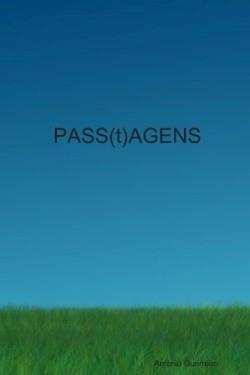
Pass(t)agens
In Portuguese passagem is a journey and Pass(t) agens is a book of Portuguese poetry whose title plays on the plural from of the word. This journey does not contain all of the guideposts that one would expect like page numbers and a table of contents or index which makes it difficult for readers to quickly return to their favorite poems. The dedication indicates that the writer intends the book for the women in his life.
The poems begin (literally) with a shout since the first poem is called “Grito.” This poem begins with a list of adjectives as grievances and continues with a call to action. The poem that follows does shout as the writer answers a rhetorical question with “I AM RIGHT!” written all in uppercase letters.
These first poems might lead readers to believe that all of the poems are forceful when really what follows are poems that are more philosophical in nature. Many are poems of being in-between not one thing or another. The writer likes to use either/or phrases with opposing words and asks a lot of questions.
In “Fim” the text asks the reader to contemplate his or her own death and after all the questions the conclusion is “You will be alone.” So at the end of all the musings the writer is fatalistic believing that the path before us is already set. “Intermedio” puts readers in between the “simple no and the eternal yes.” “Tudo” tells us that everything is already decided but ends by saying that all is set except “you.”
The second section “Pastagens” is shorter with less of the either/or sentiment found in the first section and more direct commentary on relationships. The first poem “Caroussel” states that “everything has its purpose in our lives.” One poem attempts to define seduction while another is a he said/she said poem that includes emoticons. The poem whose title translates as “Hands” dwells on the magic of touching another person. Poems titled “Dysfunction 1” and “Dysfunction 2” explore what it means to be messed up but conclude that even with the emptiness of daily life God is still there.
Based on the seemingly conflicting points of view about life and love that are found throughout the book it might seem as if the poet’s opinions are all over the board but if we all compiled our views most of us would end up with a mixture of varying viewpoints as well. Perhaps the message of poem “Haja Vontade” sums up the writer’s themes: live but with restraint.
Disclosure: This article is not an endorsement, but a review. The publisher of this book provided free copies of the book and paid a small fee to have their book reviewed by a professional reviewer. Foreword Reviews and Clarion Reviews make no guarantee that the publisher will receive a positive review. Foreword Magazine, Inc. is disclosing this in accordance with the Federal Trade Commission’s 16 CFR, Part 255.
